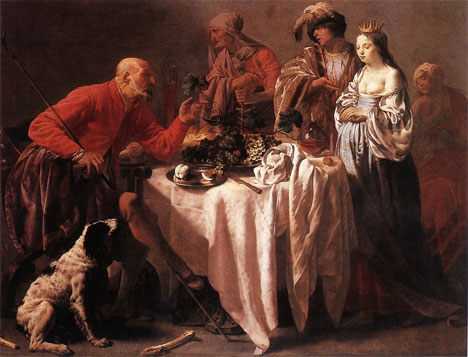Advice from a Sojourner
James Jordan has a great little commentary on Proverbs 30, the words of Agur (“sojourner”). Some believe the author of this chapter is Jacob. Jordan runs with this possibility and makes some wonderful observations.
The true son of God – or daughter of God – is a sojourner. That was true of Christ Jesus, and it is also true of us. For this reason, the proverbs of Agur the Sojourner are most relevant to us. These Sojourning Proverbs have a common theme, and that theme, announced in the opening paragraph, is humility. These are the proverbs of a man who learned wisdom by practicing humility…
The words of the Sojourner (Jacob?) the son of Yahweh,
blessed is He, the burden:
The man declares, “I have wearied myself, O God!
I have wearied myself, O God, and I have come to an end!
For I am more stupid than any man,
And I do not have the understanding of a man.”Compare this with what Jacob said to Pharaoh: “The days of the years of my sojourning are 130; few and evil have been the days of the years of my life, nor have they reached the days of the years of the life of my fathers during the days of their sojourning” (Gen. 47:9).
I’m going to assume in these studies that these proverbs were written by Jacob. They were written at the end of his life, when he had “come to an end.” It is possible that there is a better solution to the puzzle of the opening verses of Proverbs 30, and if that is indeed the case, it will not change very much of what we shall find in the rest of the chapter. Whether Jacob wrote this chapter or not, it is certainly the case that Jacob’s life illustrates what we find here. The applications to us today will be the same in any event.
Notice Jacob’s [or Agur's] remarkable humility at the end of his life. Age and experience have not made him arrogant and proud. Rather, as Jacob considers things, he says that he is stupider than anyone he knows. He does not have the understanding that we can expect of any ordinary person. He has not learned wisdom (v. 3).
Have you ever felt this way? I believe that “the more you know, the more you don’t know.” The word “sophomore” means “wise fool,” or “sophisticated moron.” It is used of young people who think they have learned wisdom, but who obviously have not. In fact, the wiser we become, the more aware we are of how little we know. The more we learn about God, the greater is our awareness of the tremendous depth of His infinity. The older we grow in Christ, the more child-like we become-not childish in the sense of irresponsibility, but child-like in the sense of wonder and humility. Remember, the book of Proverbs is addressed to children (Prov. 1: 8).
But Jacob the Sojourner knows one thing that changes everything: “But I have knowledge of the Holy One” (v. 3; compare the old man’s knowledge in 1 John). Jacob may be worn out with living. He may feel defeated in his attempts to “exercise dominion.” He may be overwhelmed by his lack of personal wisdom; but there is one thing he does know: He knows God. And he knows that knowing God is the beginning of true wisdom (Prov. 1:7).
Knowing God makes for humility. Job 38-42 expand on what we find in verse 4 here. The questions Agur asks, such as “Who has gathered the wind in His fist?” are just like the questions God asks Job. As God humbled Job by revealing Himself, so Agur expresses humility before the knowledge of the God who created and reigns in heaven and earth.
What Job realized and what Agur realized, and what we must realize, is that we don’t need to understand everything. We don’t need to understand everything because we have God as our Father and He understands everything. Moreover, we don’t have to do everything. If we are tired, and can’t go any farther, it’s all right, because God is our Father, and He can do everything. The tired Sojourner can rest in the comfort of God’s Omnipotence.
James B. Jordan, Advice From a Sojourner, Humility and Dominion in Proverbs 30. Available from www.biblicalhorizons.com


























